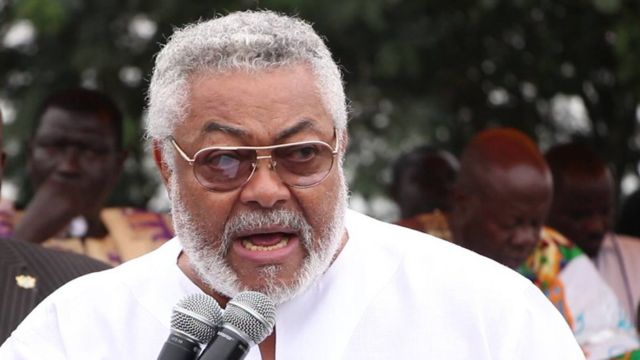‘I thought we laid a solid foundation’ – Rawlings unsure about Ghana’s future
Former President John Jerry Rawlings has expressed fears over the future of Ghana, a country he led for 19 years.
“Truly, truly, it saddens, and I thought we laid a solid foundation that could have been built on, but human greed and selfishness, etc, the crave for power blinds to some of the good things in life,” he said.
Recounting the fight against corruption as Head of State, former President Rawlings said he never compromised on corrupt tendencies.
“But there again, talking about my leadership, I think I spent 40% of my time watching and fighting corruption and corruptible tendencies. Ohh! I didn’t compromise on that, but somehow others seem to want it, to live with it. Others appear to welcome it”.
“They profit from negativity. No! no, no, that shouldn’t be happening. You won’t develop properly.
According to him, unlike his time, some people “tend to encourage corruption because they benefit from it” he said.
“I wish I could answer that question in all earnestness. But it’s difficult for me to do so because people who work so hard, slave their lives away, like [in] other countries expect an improvement in their living conditions, but in Africa that is not what I see. And it saddens me,” he told Asaase Radio.
Jerry John Rawlings was Ghana’s leader from December 31, 1981, to January 7, 2001. From 1981 to
. Before then, he was also the Chairman of the Armed Forces Revolutionary Council, which led Ghana from June 4, 1979, to September 1979.
From 1981 to January 7, 1993, he led the country as a military leader and then transitioned to a democratic leader when he led the National Democratic Congress (NDC) to win two elections in 1992 and 1996.
The Rawlings economy
When he took over in the 1980s, Rawlings turned to liberal economic reforms. That decision has been praised and criticised in equal measure.
The accomplishments of Rawlings during the 1980s and early 1990s reflect a period officially referred to as the “period of rebirth” in Ghana.
With the backing of the Bretton Woods institutions, Rawlings embarked on structural adjustment programmes, which opened the economy to private investments.
The economy saw a huge revival, spurring economic growth in a country that struggled to provide basic consumables of its citizens.
Rawlings’ government helped to alleviate the economic and social conditions in Ghana during this period, there was also a downturn.
Some Ghanaians saw the structural adjustment as causing hardship, especially in urban Ghana. The new macro-economic policies in Ghana also led to a retrenchment in the mainly urban and public sector but it did shift resources and productivity toward the rural areas.
For instance, many urban groups bore much of the cost of the reform programmes, while internal trade terms between rural and urban now favoured rural producers. Farmers who struggled to find markets for their produce began to make money from the new shift. A few industries also headed to the rural areas but the economy generally an import-led one.
According to experts, under structural adjustment, business groups benefited from price liberalisation that generated profit margins. The influence of external interest increased under economic liberalisation, including donor agencies and multi-national corporations, especially on key sectors, since they are often viewed as representatives of foreign interests whose main objectives are to dominate developing countries and entrench their monopolistic positions in Africa.
The regime until the early 1990s also recorded countless excesses, including extrajudicial killings. In June 1982, three judges and a senior military officer were abducted and killed.
But it also credited with media freedom, which was initialed curtailed until 1995 when the first radio station—Radio Eye was establishment but closed down. But would open doors for many others as the courts give the green light.




you are a disgrace to mankind tampirika